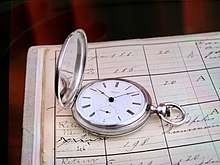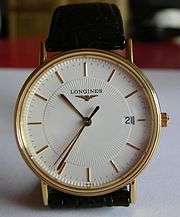Longines
Compagnie des Montres Longines Francillon S.A., or simply Longines (French pronunciation: [lɔ̃ʒin]), is a Swiss luxury watchmaker based in Saint-Imier, Switzerland.[1][2] Founded by Auguste Agassiz in 1832, the company has been a subsidiary of the Swiss Swatch Group since 1983.[3][4] Its winged hourglass logo, which was registered in 1889, is the oldest unchanged yet still active registered trademark.[5]
 | |
| Subsidiary | |
| Industry | Watch manufacturing |
| Founded | 1832 |
| Founder | Auguste Agassiz |
| Headquarters | , |
Area served | Worldwide |
Key people | Walter von Känel, President |
| Products | Wristwatches, timing devices/systems |
| Revenue | CHF 1.47 billion (2017) |
Number of employees | 340 (2009) |
| Parent | The Swatch Group |
| Website | www |
History
1832–1867

Longines was founded in Saint-Imier in 1832 by Auguste Agassiz, a Swiss watchmaker and brother of biologist Louis Agassiz.[3][6] Auguste had two partners, lawyers Henri Raiguel and Florian Morel, and the company's original name was Raiguel Jeune & Cie.[7][8] By 1846, Raigeul and Morel had retired from the watch industry, leaving Agassiz as sole company head.[3]
Several years later, Agassiz brought in his bright, enterprising nephew, trained economist Ernest Francillon, into the business.[3] Francillon was the mastermind behind several impressive innovations that would distinguish the company from its competitors. One early stroke of genius from Francillon was to solely produce crown-wound pocket watches rather than the prevalent key-wound alternative. Later, when Agassiz started suffering from ill health, he passed leadership to Francillon.
1867–1878
Under Francillon, the company began segueing out of the établissage system and moved towards more modern production methods. Francillon solidified his firm’s progression to mass production in 1867 by establishing his first factory.[3][8] Its location, an area in southern St. Imier known locally as Les Longines (“long meadows”), gave rise to the Longines name. To help further his efforts to improve the production at Longines, Francillon brought on Jacques David, a talented engineer. In addition, Francillon appointed David as Technical Director and put him in charge of the new factory. By 1867, it was also marked the year the Longines factory produced its first in-house watch movement, the 20A. The 20A, built with an anchor escapement (usually employed in pendulum clocks), was wound and set via a pendent crown. The innovative movement won an award at the 1867 Universal Exhibition in Paris.
Several years later, the U.S. watchmaking industry was earning fame worldwide for making great strides in industrialized watch manufacturing. Francillon sent Jacques David to the 1876 World’s Fair in Philadelphia to gather new ideas and strategies from the Americans. Upon returning, David wrote a comprehensive 108-page report on what he had learned about American watch production. Essentially, this report is considered one of the most significant documents in watchmaking history. It detailed the inner workings of American watch factories, including the entire production process from raw materials to finished watches. Additionally, David also shared the highly-effective internal structure and quality control measures implemented in these factories. In his analysis, David concluded the Swiss watchmaking industry needed to change significantly to keep pace with American competitors.

On November 6, 2018, Longines announced the discovery by Seiji Lépine of serial number 183 dating the watch to October 23, 1867. This is one of the earliest Longines watches produced.
1878–1931
In 1878, Longines developed its first chronograph movement, the 20H.[3] It was a “mono-pusher” chronograph, in which all 3 chronograph functions- start, stop, and reset – were controlled via the crown. With the 20H, Longines could produce stopwatches suitable for precise timing in professional events. This was when Longines began building its reputation in equestrian sports such as horse racing and jumping.
By 1880, Longines was known for the quality and precision of its timepieces.[8] To Francillon’s dismay, the brand became a target for counterfeiters looking to pass off cheaply-made watches as genuine Longines products. “Knock-offs” of Longines were not only directly stealing business and revenue from Francillon, but also potentially damaging his company’s reputation. Therefore, Francillon made the wise decision to trademark the Longines name in 1880, and distinctive winged hourglass logo in 1889.[3] By 1886, Longines had already established itself as a primary supplier of timing equipment for most New York sporting officials.
1931–1971
In 1931, Longines collaborated with Charles Lindbergh to introduce an aviation watch called Longines Weems after P. V. H. Weems.[9] In 1954, Longines introduced a timekeeping instrument called Longines Chronocinegines.[10]
Slogans
Longines began using the slogan "Elegance is an Attitude" in 1999. Their previous slogan, "The World's Most Honored Watch" was used for most of the 20th century.[12][13]
Watch manufacturing
In December 2018, World Wide Fund for Nature (WWF) released an official report giving environmental ratings for 15 major watch manufacturers and jewelers in Switzerland.[14][15] Longines, along with 7 other manufacturers including Omega, Rolex and Tissot, was given the lowest environmental rating as "Latecomers/Non-transparent", suggesting that the manufacturer has taken very few actions addressing the impact of its manufacturing activities on the environment and climate change.[14][15]
There are concerns over the lack of transparency in manufacturing activities and the sourcing of precious raw materials such as gold, which is a major cause of environmental issues such as pollution, soil degradation and deforestation.[14][15] The situation is especially serious in the developing countries which are top producers of gold, including China, Russia and South Africa.[16][17][18][19] It is estimated that the watch and jewelry sector uses over 50% of world's annual gold production (over 2,000 tons), but in most cases the watch companies are not able to or are unwilling to demonstrate where their raw materials come from and if the material suppliers use eco-friendly sourcing technologies.[14]
Notable patrons and owners
Notable Longines brand ambassadors and timepieces owners include Humphrey Bogart, Harry Connick Jr., Audrey Hepburn, Lin Chi-ling, Eddie Peng, Aishwarya Rai, Kate Winslet , Simon Baker and so on.[20][21][22][23][24]
In particular, Albert Einstein owned two timepieces from Longines, one 1943 silver pocket watch and one 1929 gold wristwatch.[Note 1][25][26][27][28] His Longines' wristwatch, which was presented to him by Rabbi Edgar Magnin in 1931, was auctioned by Antiquorum for US$596,000 in New York on October 16, 2008, making it the most expensive Longines' timepiece ever sold at auction.[25][29] His Longines pocket watch is now kept in the Bern Historical Museum in Switzerland.[26][30]
Sponsorships

Since Longines developed its first chronograph movement in 1878, the brand has steadily built strong relationships with various sporting organizations, events and teams worldwide. First came horse racing, then additional equestrian sports – show jumping, endurance riding, and eventing (a “triathlon” of dressage, cross-country, jumping).
Today, Longines is designated as official timekeeper, partner, and watch for competitions worldwide including:[31]
- Formula One World Championship (1980s)
- Archery World Cup
- Commonwealth Games
- French Open
- World Artistic Gymnastics Championships
- FEI Show Jumping World Cup
- FIS Alpine Ski World Cup
Notes
- In addition to the two timepieces from Longines, Albert Einstein also had a Patek Philippe pocket watch, which he ordered in 1915 (the year he completed his theory of General Relativity) and is now kept in the Patek Philippe Museum in Geneva, and a possibly German-made, unknown-brand pocket watch (circa 1900), which was auctioned by Christie's for GBP 266,500 in London on 13 July 2016.
References
- "Longines - Swatch Group". www.swatchgroup.com. Retrieved 2019-02-04.
- "Company Overview of Compagnie des Montres Longines Francillon S.A." www.bloomberg.com. Retrieved 2019-02-04.
- "History of Longines in 1832 - 1832". www.longines.com. Retrieved 2019-01-23.
- "History of Longines in 1983 - 1983". www.longines.com. Retrieved 2019-02-04.
- "Longines - A Timeless Logo". fhs.swiss. Federation of the Swiss Watch Industry. October 12, 2009. Retrieved 2018-01-22.
- Francillon, André (2005). History of Longines. p. 75.
- "The history of Longines® in 1832". www.longines.com. Retrieved 2019-01-23.
- "A History of Longines | Xupes". www.xupes.com. Retrieved 2019-01-23.
- "The History of the Pilot Watch Part Four: Longines and Lindbergh". Monochrome Watches. 2013-01-04. Retrieved 2019-01-10.
- Knowles, Arthur; Beech, Graham (2001). The Bluebird Years: Donald Campbell and the Pursuit of Speed. Sigma Leisure. ISBN 9781850587668.
- "The History of Quartz Weekend: Part 2 - Longines, the Swiss Enter the Fold". Watchonista. 2018-06-09. Retrieved 2019-01-10.
- "Longines Ambassadors of Elegance". www.longines.com. Retrieved 2019-01-23.
- "Aishwarya Rai Bachchan : Longines Ambassador of Elegance Since 1999 | Longines®". www.longines.co.uk. Retrieved 2019-01-23.
- "Environmental rating and industry report 2018" (PDF). World Wide Fund for Nature. Retrieved 2019-01-19.
- swissinfo.ch, S. W. I.; Corporation, a branch of the Swiss Broadcasting. "Swiss luxury watches fail to meet environmental standards". SWI swissinfo.ch. Retrieved 2019-01-19.
- Vidal, John; Guest, graphic by Pete (2015-08-15). "How developing countries are paying a high price for the global mineral boom". The Observer. ISSN 0029-7712. Retrieved 2019-02-02.
- "China needs to get to grips with its gold mining pollution crisis". www.chinadialogue.net. Retrieved 2019-02-02.
- Einhorn, Dom (2015-02-09). "Mining in Russia: An economic boost or an environmental threat?". Born2Invest. Retrieved 2019-02-02.
- "South Africa has failed to protect locals from gold mine pollution: Harvard report". MINING.com. 2016-10-12. Retrieved 2019-02-02.
- "Profiles In Time: Humphrey Bogart's Watches". Crown & Caliber Blog. 2017-04-21. Retrieved 2019-01-22.
- "Harry Connick Jr - Longines: Ambassador Of Excellence". Federation of the Swiss watch industry FH. Retrieved 2019-01-23.
- "Profiles in Time: Audrey Hepburn's Watch". Crown & Caliber Blog. 2018-01-04. Retrieved 2019-01-22.
- "Aishwarya Rai Bachchan : Longines Ambassador of Elegance Since 1999". www.longines.com. Retrieved 2019-01-22.
- "Kate Winslet : Longines Ambassador of Elegance". www.longines.com. Retrieved 2019-01-24.
- "Albert Einstein's Longines watch fetch... - 16/10/2008 | Longines Media Center". mediacenter.longines.com. Retrieved 2019-01-22.
- "[EINSTEIN, Albert (1879-1955)]". www.christies.com. Retrieved 2019-01-23.
- Broer (2005-07-02). "Einstein's Longines on display". Fratello Watches. Retrieved 2019-01-22.
- "Profiles in Time: Albert Einstein". Crown & Caliber Blog. 2018-03-22. Retrieved 2019-01-22.
- "Unique and Historically Important Longines, No. 4876616, case No. 66968. Made in 1930, presented to Professor Albert Einstein on February 16th, 1931 in Los Angeles". catalog.antiquorum.swiss. Retrieved 2019-01-22.
- "Longines gold watch - Albert Einstein | Watch ID". www.watch-id.com. Retrieved 2019-01-28.
- Anthony, Paul. "Longines Watch Brand History - An Enduring Quest For Elegance". bespokeunit.com. Retrieved 2019-01-10.
External links
| Wikimedia Commons has media related to Longines. |